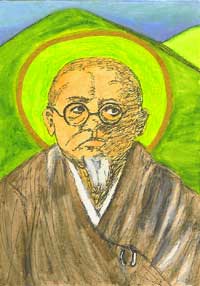A Poet Outside: Santoka
by rebecca ~ December 12th, 2005. Filed under: Poems & art. Painting by me, 2002.
Painting by me, 2002.
I wish to devote this entry to a poet I consider my soulmate (of another time, plane and place), the free-style haiku poet, Taneda Santoka (1882-1940). The ‘o’ in his name is a long ‘o’, like how Minnesotans say ‘o.’
I first found out about him over 10 years ago when I was living in the student quarters of a Buddhist nunnery in Kyoto. His poems were why I extended my stay in Japan and the reason why I try to learn Japanese. I felt he had a lot to teach me about seeing the simple truth, beyond the suffering and pain in the world.
‘Santoka’ (his pen name) means Mountain + Head or Top+ Fire, so something like Head of Mountain Fire or Fiery Mountain Peak might work as a rough translation. I love his name.
Santoka had a hard life: he saw his mother pulled from the family well after she had committed suicide. He dropped out of Waseda University’s Literature Department (as many great Japanese writers did), started and failed a sake brewery with his father, married and failed at that, too, became an alcoholic…and after a suicide attempt at the train tracks, he was taken to a Zen temple, where he eventually was ordained as a Zen monk at age 44. Rather than stay in the comfort & safety of any particular school of the Buddhist religion, he traveled alone as a beggar-monk across Japan, composing haiku and travel notes along the way.
He walked over 28,000 miles in 14 years. His poems follow the jiyuuritsu(free)-style of haiku, not the strict and socially-acceptable 5-7-5 syllable patterns, but rather he used as few or as many syllables needed to express the ‘moment.’ The only rule was to express it within the space of one breath.
Samples of some of his haiku (as translated by John Stevens in his book, Mountain Tasting):
I sit in the withered beauty of the wild grasses.
kareyuku kusa no utsukushisa ni suwaru
Within life and death snow falls ceaselessly.
shouji no naka no yuki furishikiru
If it shines, it bleats; If it is cloudy, it bleats–The single goat
tereba naite kumoreba naite yagi ippiki
The moonlight pierces my empty stomach
tsuki no hikari no sukihara fukaku shimitoru nari
I cling to death; the pepper is bright red
shi wo hishito tougarashi makka na
More of his works translated into English and French can be found online here.
I am trying to find a path toward the essence of being alive that Santoka well understood. I believe I can make it, step by step.